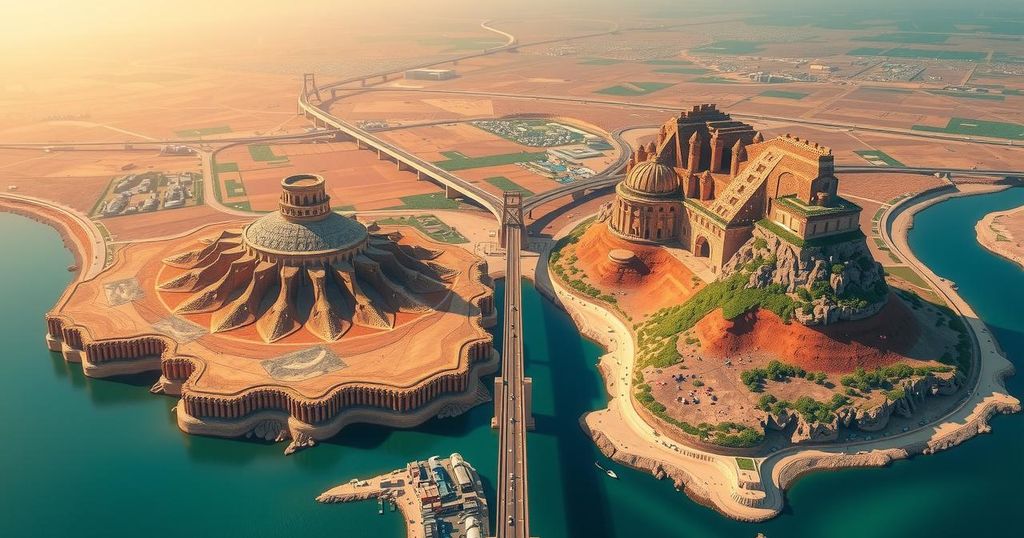Why Iraq Should Build Bridges With Its ‘New’ Neighbor, Syria
Iraq’s approach to its neighbor, Syria, is evolving in the wake of the country’s political shifts following the ousting of Bashar al-Assad. As Iraq moves towards recognizing Interim President Ahmad al-Sharaa, internal divisions persist, particularly from Iran-affiliated factions. Economic opportunities exist for cooperation, notably in oil exports and labor integrations, but security concerns linger. The Iraqi government must navigate these complex dynamics to forge a successful relationship with Syria.
Since the ouster of Bashar al-Assad, the situation in Syria has taken a turn, particularly with the West cautiously embracing Interim President Ahmad al-Sharaa. His new government, filled with technocrats and former dissidents from Assad’s regime, is keen on rekindling international ties. Al-Sharaa’s diplomatic missions have included visits to nations like Saudi Arabia, UAE, Qatar, Jordan, and Turkey, which seemed promising. However, controversy arose surrounding his potential attendance at the Arab Summit.
The Iraqi government’s stance on the swift changes in Syria is quite divided. There seems to be a split opinion between the official government and the influential non-state actors within Iraq. Initially, the Iraqi response was rather measured — they closed border crossings and stationed troops along the 630-kilometer border with Syria. But over time, Iraq has adopted a more practical approach, allowing officials to visit Syria in acknowledgment of al-Sharaa’s regime. Notably, an April meeting between Iraq’s Prime Minister and al-Sharaa in Doha led to an invitation to the Arab Summit, hosted by Baghdad in mid-May.
On the flip side, Iran-affiliated entities in Iraq are pushing back against normalization with Syria. More than fifty members of the Iraqi parliament, primarily from the Shiite Coordination Framework, opposed al-Sharaa’s visit to Baghdad. Member Mustafa Sanad went as far as organizing a protest against al-Sharaa appearing at the summit. Meanwhile, militia leaders who once operated in Syria threatened the Syrian president on social media, while some Iranian-aligned media outlets launched disinformation campaigns to smear al-Sharaa’s reputation, including producing forged documents about his past.
There’s a historical context here, too. Under Baathist rule, there were longstanding grudges between Iraq and Syria, notably accusations from former Iraqi Prime Minister Nouri al-Maliki against Assad for sending militants into Iraq. Before the Syrian turmoil, 1.2 million Iraqi refugees had already sought safety in Syria, leading to robust trade relations peaking at four billion dollars annually. But post-2011, as the Arab Spring unfolded, relations soured again, with Iranian interests stepping in to solidify ties through shared political and security goals.
Despite security disruptions, economic ties dwindled but endured. Iraq continued to import key agricultural products, though imports from Syria dropped dramatically from around 80% of the market share down to just 5% in late 2024. Looking ahead, to bolster its agricultural efficiency, Iraq could strengthen its economic cooperation with the new Syrian government.
Multiple Iraqi delegations have visited Syria, and the latest high-level delegation, which happened in April, indicates a pragmatic shift from Baghdad. This team included officials deeply involved in economic interests, focusing on the crucial Kirkuk-Baniyas oil pipeline. Reviving this pipeline for direct access to the Mediterranean could enhance Iraq’s oil export capabilities significantly and diversify trade options.
As the West starts cautiously approaching the new Syrian leadership, Iraq’s involvement can be strategic. Iraq is home to a seasoned energy sector, capable of investing in Syria’s natural resources, especially with a vacuum left by Iran’s declining influence. There lies potential for labor cooperation, too, where Iraqi law could allow legal employment routes for skilled Syrian workers, which could address labor shortages domestically while supporting Syria’s economy indirectly.
Yet, security concerns need addressing first. The porous Iraqi-Syrian border has been a hotspot for extremism and illegal activities. Both governments share a heightened awareness of terrorism and its ramifications, particularly after the fall of ISIS. However, even today, unregulated movements threaten stability. Moreover, foreign influences, like the commentary from Israeli Prime Minister Netanyahu, advocating for a fragmented Syria, pose significant threats to Iraq’s national integrity.
To seize this moment, Iraq should embrace a new beginning with Syria. Though the Arab Summit did not see al-Sharaa attend due to militia threats, fostering partnerships is crucial. Iraq must regulate militias and establish clear communication with Syria to stabilize the region. Continued high-level visits will bolster Iraq’s voice in Syria’s transitional matters and ensure its influence.
Engaging local communities beyond official government dialogues can also create a more nuanced understanding of the shifting dynamics. In the face of misinformation, building strong local relationships is essential.
For real collaboration, Iraq also needs to invest in border security and cooperation to prevent extremism’s resurgence and illicit smuggling across borders. The neglected areas must be brought under government oversight to ensure well-monitored movement.
Finally, Iraq should identify and facilitate economic opportunities through solid trade agreements and encourage Syrian laborers’ integration into the Iraqi workforce. Legalizing the status of these workers can significantly boost the local economy and mitigate the brain drain to foreign nations.
In summary, despite the complex ties and challenges faced in the past, this moment offers Iraq the chance to foster a new pathway with Syria, promoting peace and mutual benefit in the volatile landscape of the Middle East.
In conclusion, Iraq stands at a pivotal moment to redefine its relationship with Syria, embracing opportunities for economic cooperation and enhanced stability. The challenges posed by non-state actors and historical grievances need addressing, but the potential gains in energy and labor markets present a compelling case for collaboration. By fostering communication, enhancing security, and deepening economic ties, Iraq can help shape a more stable and prosperous future for itself and its neighbor.
Original Source: www.atlanticcouncil.org




Post Comment